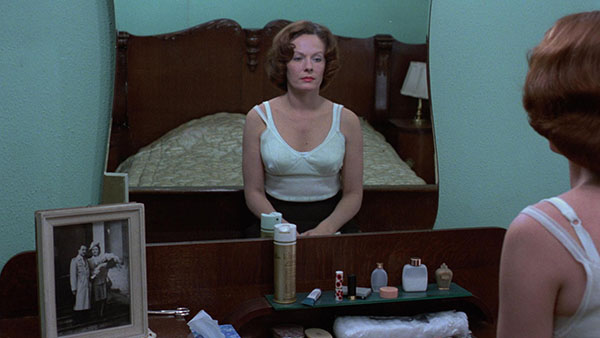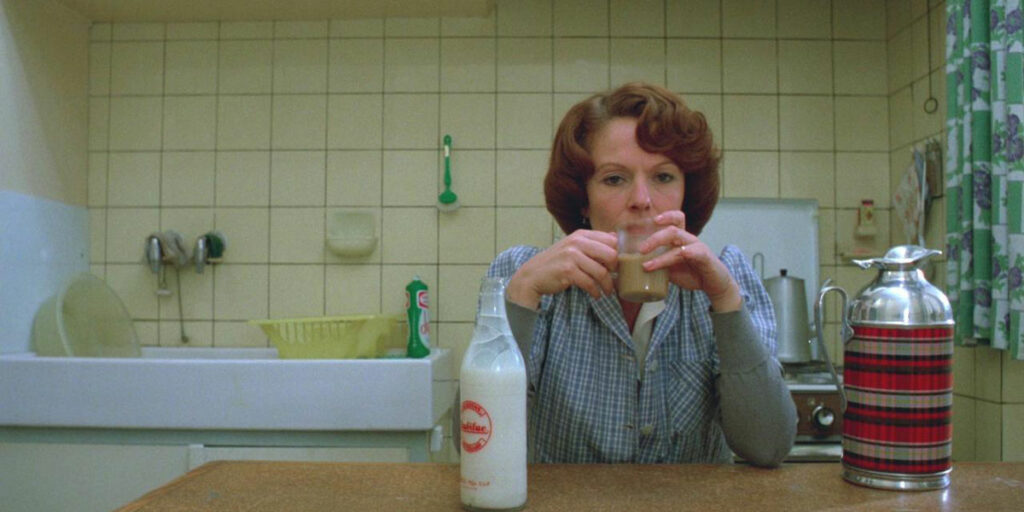Jeanne Dielman, 23 quai du Commerce, 1080 Bruxelles, directed by a 24-year-old Chantal Akerman, is a masterpiece of minutiae, motherhood and misery.
Jeanne Dielman, 23 quai du Commerce, 1080 Bruxelles (1975) is the first film by a female director to top Sight and Sound’s decennial poll, and only the fourth film to do so since the poll began in 1952. It is a challenging, experimental behemoth that continues to provoke strong reactions from champions and naysayers alike.
Plot-wise, Jeanne Dielman is very simple – we follow three days in the life of a widowed housewife (Delphine Seyrig, Stolen Kisses), who conducts her everyday chores, and spends (mostly silent) time together with her teenage son (Jan Decorte, Toute une nuit) when he is not at school. To tell you anything more would really veer into spoiler territory, though the mundanity of Jeanne’s doings, and the minimal plot conflict actually bring the concept of a spoiler into debate; if I tell you that Katie betrays Grace at the end of a film, that’s a spoiler for sure, but if I tell you that Darren bends over to tie his shoelaces in a scene, is that a spoiler?
Akerman’s film operates in a weird realm of its own, a testament to her impeccable craft and truly unique voice. The camera is static, the shots are long, and Jeanne’s activities are shown in real time. She peels potatoes, she cleans the dishes, she folds laundry – and you are always aware that these are real processes that have to be done, because there aren’t any cuts to save you from watching it. So much of the film’s power is in the small, wordless details – for instance, when she has finished polishing some shoes, Jeanne throws one down on the chair fervently, with its noise creating a discordant effect after following the uniform scuffing sounds – minute moments like this have immense narrative potency because they exist in the context of such mundane scenes. When you drop your fork on the floor while eating, it dominates the realm of your mind for a few seconds, and you may lose your train of thought; many moments in Jeanne Dielman have this effect because Akerman so cleverly pulls drama out of the banal.

Delphine Seyrig’s performance as Jeanne Dielman is phenomenal, thankfully – it’s really integral to the film’s power that she embodies the character so perfectly. Jeanne’s aloof son Sylvain seldom speaks to her, even at dinner, and one of their most important conversations sees Sylvain looking away from her, past the camera – there is this Bressonian quality which illustrates their social detachment in crushing fashion. In their first scene together, they eat dinner while Sylvain stares at his book, completely uninterested in the plight of his mother. The film is set over three days, so we do see a diverse arrangement of chores, and although the film obviously does not wholly take place in real time, we are allowed intimate access into the life of somebody whose relationships are lacking and whose circumstances appear tragic.
The auteur and the subject exist on separate planes; while Jeanne (presumably) pines for a better life, Akerman frees herself from the constraints of mainstream cinema, communicating in her own cinematic language that draws attention to aspects of the human (and specifically female) experience that most films gloss over. Its ascension to the top of the world’s widest ‘best film’ poll is a significant cultural moment because the previous No. 1s (Bicycle Thieves, Citizen Kane and Vertigo) have contributed so much to developing mainstream notions of cinema, while Jeanne Dielman‘s influence is much more underground, and formally appears to reject conventions of plot time, conflict, and the traditional machinations of carefully curated frames and dialogue. Seldom before has a film so intentionally drawn attention to the passage of time – ‘In my films you are aware of every second passing by,’ Akerman famously proclaimed.
Jeanne Dielman is an absolute triumph of experimental filmmaking, a film that challenges the very conventions of mainstream cinema and of storytelling more generally while allowing for a bounteous wealth of academic and philosophical discussion. While its 202-minute runtime may appear daunting, don’t let it deter you – save it for a day when you are ready, and watch it in a distraction-free environment. Many people will approach the film merely as ‘one to tick off’ as opposed to one to revisit, muse over and cherish, but that’s okay – to see it even once is totally worth your time. This masterpiece is a truly seminal piece in the world of ‘slow cinema’, and carries a crushing emotional punch that would have been unattainable within the constraints of more narrative-focused, faster-paced conventional cinematic frameworks, because Akerman strips away plot artifice and avoids overt didacticism or heavy-handed moralising by letting the images and central performance speak for itself.
Jeanne Dielman, 23 quai du Commerce, 1080 Bruxelles is now available to watch globally on digital and on demand, and also on the BFI Player in the UK.

